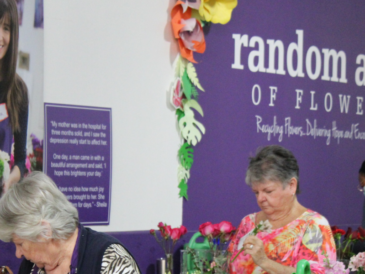Photo taken from Pexels
At the University of Tennessee, first-year composition (FYC) is a two-semester sequence of courses required by all students in their freshman year. In 2023’s fall semester alone, there are over two hundred sections of English 101 to accommodate the considerably sized freshman class.
The instruction of FYC courses is an undertaking shared by faculty and graduate students alike in the English department—full-time lecturers, master’s candidates, PhD candidates and post-docs take on the responsibility of writing instruction at the university.
Fundamental to this operation is Madeline Crozier, the fourth-year PhD candidate balancing her dissertation work, teaching writing and serving as assistant director of the composition office.
Crozier not only teaches her own courses, but supports the rest of the Graduate Teaching Associates (GTAs). She actively advocates for raising the stipends of graduate students, supplies her cohorts with supplemental classroom aid, offers herself as a shoulder to cry on and she bakes us cookies every week!
Crozier is passionate about shifting writing instruction in the direction of cross-cultural composition and linguistic justice. This includes equitable assessment methods (contract-based grading or “ungrading”) and anti-racist pedagogy.
In 2022, she was awarded the inaugural David A. Hambright Teaching Award for Graduate Students. The award committee noted being “impressed by her dynamic lecturing, thoughtful comments on students’ papers and high-quality teaching materials.”
Crozier expressed that this award has been a driving force for her.
“I try to use this platform to uplift GTAs and praise the meaningful and incredible work we do,” Crozier said.
Crozier is currently working on what she calls the “Real Hours” Project. This is an ongoing effort to recognize the work of GTAs and campaign for better compensation.
“This work definitely parallels the responsibility I feel in my dissertation to advocate for change for GTAs,” Crozier said.
She declares graduate students to be one of the least supported groups in the university system, despite being one of the most strained.
Here she shared what drives her to innovate, her experiences teaching FYC and her dissertation progress.
What gave you the confidence to take such control of your courses and share your ideas for change?
Crozier: I have had the opportunity to teach English 132 (a course for “non-native speakers of English”) and English 102/132, a cross-listed course. This course purposely integrates native English speakers and English language learners in the same classroom. I gained more confidence to communicate with students the value of developing racial literacy, or their ability to identify and act in response to race and racism in their lives. I hope students leave my classrooms with confidence in their identities as writers and critical awareness of linguistic bias and ways to address it in their professional, civic and personal lives.
What sorts of results have you seen so far in structuring your courses with these goals?
Crozier: I have seen the most significant impact on students by teaching with labor-based grading, or what’s often called “ungrading.” I’m not alone in this—more than one-third of all instructors teaching FYC courses in the Fall 2023 semester use some form of equitable assessment. Ungrading emphasizes fairness and equity because it assesses students based on labor and effort. In contrast, conventional grading assesses students based on subjective judgments about the quality of their work, which often means judging students against their adherence to dominant, white, mainstream “standardized” English.
Can you tell me more about your dissertation? What are your goals for this project, and what kind of afterlife do you imagine it having?
Crozier: My dissertation will follow eight English GTAs during their first year teaching at UTK to document their teaching and assessment practices. By preserving and honoring GTA voices, I hope this research can identify opportunities to support the professional development of writing instructors, advance equity in teacher training and graduate education, and improve the educational experiences of undergraduate students. I came to this topic through my experiences as a GTA realizing a significant gap between how much writing assessment impacts undergraduate students and how little training most GTAs receive about how to assess writing ethically and effectively.
How is the “Real Hours” project going? How is it working so closely with GTAs and taking on this burden?
Crozier: I designed and carried out a research study—it found that even though GTAs are compensated for 10 hours of labor per week per FYC course, more than 70% of GTAs work more than this. The average was more than 15 hours per week per FYC course. The university puts GTAs in a double bind because the commitments we have for our students require and reflect far more time, energy, and labor than the university acknowledges.
Ultimately, Crozier believes that each student in the writing classroom, regardless of linguistic background, deserves the opportunity to flourish. She pursues her goals with the hope that her endeavors in the Composition Office and her dissertation research will outlive her time as a graduate student at UTK.
Indeed, Madeline Crozier has left an extraordinarily positive mark on first-year composition at UTK, paving the path for graduate students after her and imparting confidence to undergraduate students in the writing classroom.





